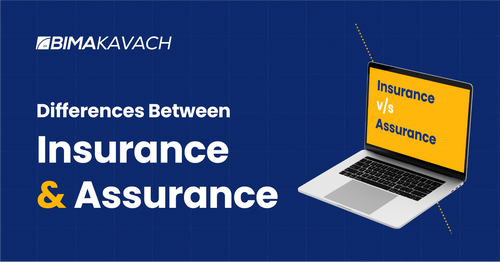When it comes to financial protection and risk management, the terms "insurance" and "assurance" are often used interchangeably. However, they have distinct meanings and implications within the realm of personal and financial security. Understanding the differences between insurance and assurance is crucial for individuals seeking appropriate coverage. This article provides an overview of the disparities between these two concepts, shedding light on their respective roles and applications in the world of risk management. By clarifying these distinctions, readers can make informed decisions when considering various types of coverage for their specific needs.
But, before diving deep into the main topic, let’s turn our attention to the basics first.
What is insurance?
Insurance is a financial arrangement or contract between an individual or entity (policyholder) and an insurance company. It is designed to provide protection against potential financial losses or risks. In exchange for regular premium payments, the insurance company agrees to compensate the policyholder for specific events or circumstances outlined in the insurance policy.
Insurance plays a crucial role in safeguarding individuals, businesses, and assets from various risks. Insurance policies are available for various sectors, including health, life, property, travel, and more. Each type of insurance provides specific coverage and benefits tailored to the insured party's needs, helping them manage risks and secure their financial well-being.
Here is an example from the field of business, to make things clearer to you.
Suppose there is a manufacturing company named ABC Electronics in India. The company produces electronic goods and has a warehouse to store its inventory. To safeguard its business operations and assets, ABC Electronics decides to purchase business insurance. It contacts an insurance company and selects a suitable business insurance policy. The policy covers risks such as fire, theft, natural disasters, and liability claims. The company pays the required premium to the insurance company.
A few months later, a fire breaks out in ABC Electronics' warehouse due to an electrical malfunction. The fire causes substantial damage to the building, machinery, and inventory. In addition, neighbouring properties also suffer damages. ABC Electronics promptly contacts its insurance company to report the incident and file an insurance claim. The insurance company sends a claims adjuster to assess the damages and validate the claim according to the terms and conditions of the business insurance policy.
Once the claim is approved, the insurance company compensates ABC Electronics for the losses incurred. The compensation may cover the repair or replacement costs for the damaged property, the value of lost inventory, and even liability claims from affected third parties.
In this example, we have seen how insurance played a crucial role in protecting ABC Electronics' financial interests. By having insurance coverage, the company can mitigate the financial impact of unexpected events like fires, thefts, or liability claims. Instead of bearing the entire financial burden of the losses, ABC Electronics relies on the insurance company to provide compensation, subject to any deductibles or limitations specified in the policy.

What is an assurance?
In the insurance industry, the concept of assurance applies mostly to life and term insurance policies. A life insurance policy guarantees the policyholder that he will be compensated in the event of a specific event, such as death or disability. Furthermore, if the policyholder survives the policy's maturity period, he or she will have the option of collecting the amount on a monthly basis as a pension. These policies last longer than standard insurance policies.
Here comes another example!
Ravi acquired life insurance coverage. He bought himself an endowment plan. He buys the coverage with a sum insured of Rs. 50 lakh. This is a plan that offers two sorts of benefits. If Ravi lives until the policy's maturity date, he will get a lump sum payment from the insurance company. If Ravi dies during the term of the policy, the nominee will receive the amount of the sum insured.
Get Free Quote in Minutes
What is the difference between Insurance and Assurance?
Insurance and assurance differ in several key aspects. Here's a pointwise explanation of their differences:
A. Nature of Coverage:
Insurance: Insurance provides financial protection against specific risks or events that may result in losses. It compensates the insured party for the actual financial loss suffered.
Assurance: Assurance provides coverage on specific events such as disability and death
B. Type of Policies:
Insurance: An insurance policy is a contractual arrangement between the policyholder and the insurance company. General insurance, life insurance and liability insurance are different categories of such policies.
Assurance: Assurance policies include term insurance, ULIP, Life Insurance and so on.
C. Focus:
Insurance: Insurance focuses on mitigating the financial impact of potential risks or losses. It provides compensation or indemnity to the insured party, subject to the terms and conditions of the insurance policy.
Assurance: Assurance focuses on providing confidence and reasonable assurance to the insured that he will be compensated in the event of a specific event, such as death or disability.
D. Objective:
Insurance: The objective of insurance is to provide financial protection and mitigate the potential losses or risks faced by the insured.
Assurance: The objective of assurance is to provide stakeholders with confidence, credibility, and reasonable assurance regarding the reliability, accuracy, and compliance of the information or operations being examined.
E. What is insured
Insurance: In insurance, health, property or content in insured, as per the terms and conditions of the specific policy in concern
Assurance: In assurance, the person or the policyholder is insured
F. Claims
Insurance: In insurance, the amount of the claim is equivalent to the amount of loss or damage caused by the incident. For example, repair of a property after a fire incident, hospitalisation expenses after an accident, and so on. Also, multiple claims are allowed.
Assurance: In assurance, a predetermined claim amount is set aside for a particular event or situation. For example, death or disability from serious illnesses such as cancer and so on. Only a single claim is allowed in assurance.
The footnote:
From the discussion above, we can conclude that while insurance and assurance are related terms within the realm of financial protection, they have distinct differences in their meanings and applications. Insurance primarily focuses on the transfer of risks and provides coverage against specific events or losses, such as accidents, illnesses, or property damage. On the other hand, assurance is more comprehensive and encompasses long-term financial security, often involving savings, investments, and a guaranteed payout. Whether one requires protection against unforeseen events or seeks long-term financial stability, knowing the disparities between insurance and assurance is key to making sound financial choices.
Ultimately, both insurance and assurance play important roles in mitigating risks and providing peace of mind. By carefully assessing one's financial situation and considering specific needs, individuals can make informed choices to safeguard their financial well-being and protect against unexpected events.
Find out here various liability policy in India

